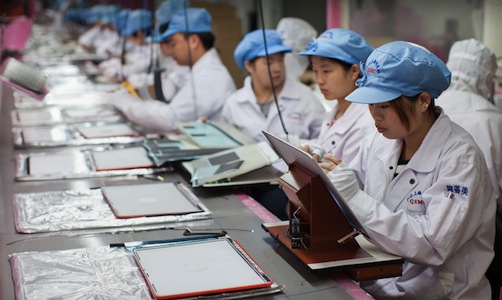Even Apple Can’t Change The Reality Of Consumer Electronics Manufacturing Overnight
There’s nowhere else in the world you can build a modern smartphone or tablet as cheaply, easily, and reliably as the massive factories of companies like Foxconn, which operate on a scale that is difficult to comprehend. The price for doing business with companies like Foxconn is living with the knowledge that these products are being built by people who have signed up for a modern-day version of indentured servitude.
This month the issue of working conditions and the human cost of producing Apple products has come up a few times with a ‘This American Life’ episode, the release of Apple’s annual Supplier Responsibility report and then this week’s New York Times report on the issue. It’s an incredibly serious issue and one that is rightly in the spotlight again. Yet whilst it is wrong to excuse Apple on this issue, the New York Times report perhaps glosses over the important part of this issue. Tom Krazit of paidContent goes one step further than the New York Times report and points out the sad, conflicted reality that if we want these luxury consumer electronics (such as the iPhone), they just have to be made in China and Apple cannot single-handedly change this reality.
As should be clear by now, Apple is only being singled out by the Times because it is at the top of the tech heap, and while that may be fair game given Apple’s unbelievable profit, it overstates the ability of the company to act as a macroeconomic force.
Apple has been the focus of these reports and backlash because they are now at the top of industry - despite the fact that by all accounts they are also one of the most transparent companies regarding this issue. As Krazit points out, Apple’s Supplier Responsibility report is far more detailed than that of Nike or GAP’s - companies that were targeted nearly a decade ago for horrifying conditions in their supplier’s factories. In fact GAP’s last report was in 2010 and Nike hasn’t even released a report since 2009.
It could use some of its $97 billion cash hoard as a carrot and the threat of losing its formidable business (Foxconn has no customer more important than Apple) as a stick. But unless Apple is willing to incur significant risk and set up its own manufacturing facilities governed by its own principles within China (something which, to be clear, may not be permitted by either China or the U.S.) it is dependent upon suppliers that have different standards when it comes to the well-being of their employees. And changing the labor laws of a foreign country is not necessarily a project that a U.S. company can throw money at and cross its fingers hoping everything works out.
Krazit’s full article is well worth the read, as he rationally examines the issue and discusses what could be done by Apple. As he and us at MacStories want to stress, Apple is right to scrutinise their suppliers and should continue to put ever more pressure on their suppliers to improve conditions. Yet it is unrealistic to expect Apple to stop relying on Foxconn and other Chinese suppliers and move production to a Western nation or equalize working conditions overnight. As Krazit notes, “even Apple doesn’t have the clout to reverse two decades of economic history that has led to the status quo”.


